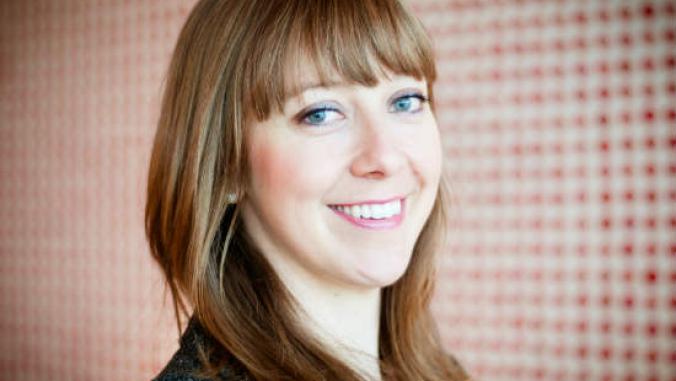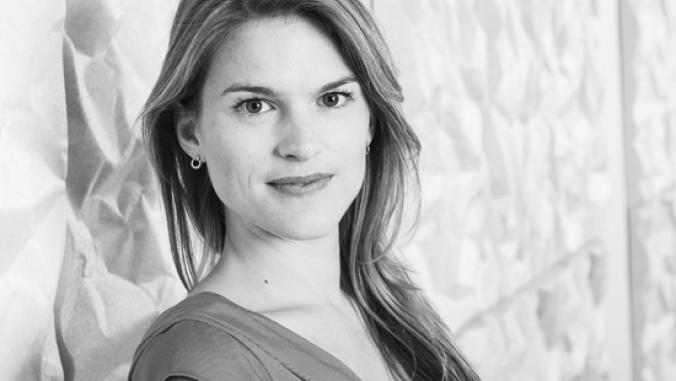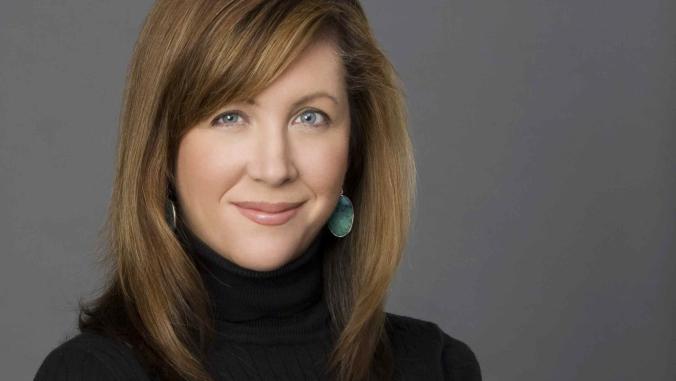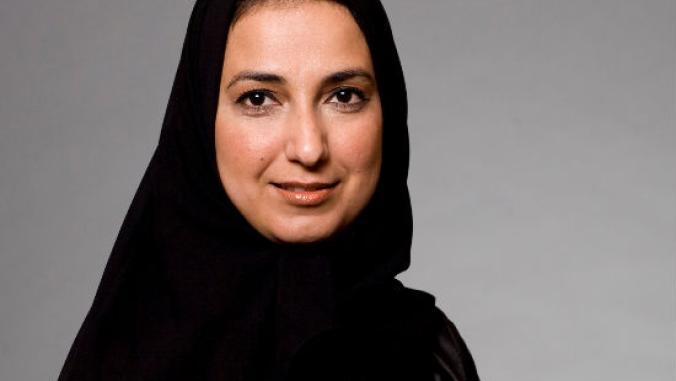How She Leads: Trisa Thompson, Dell
<p>Meet the trained lawyer who found her perfect job with the help of Dell's sustainability efforts.</p>

Photo courtesy of Dell
How She Leads is a regular feature on GreenBiz spotlighting the career paths of women who have moved into influential roles in sustainable business. In this edition, Maya Albanese interviews Trisa Thompson, vice president of corporate responsibility at Dell Inc.
Thompson will moderate an all-female panel of sustainability leaders at the GreenBiz Forum New York about the changing role of the chief sustainability officer. It will delve into how corporate sustainability organizations are becoming strategic partners to assist other business units.
Dell has been a sustainability innovator and leader in its industry, reflected by its numerous internal and external programs that support young entrepreneurs, female leadership and energy efficiency, among others. Thompson partners across all Dell functions to research and understand customers' sustainability needs. Her team conducts competitive analyses, provides assistance to the marketing and sales teams in this area, and meets with Dell's customers, mainly chief information officers.
Maya Albanese: How did you move into your sustainability role at Dell?
Trisa Thompson: I am a lawyer by training and Dell was one of my first big clients. I worked on Dell's legal team for 13 years before I moved into my current role. It was a natural evolution into the sustainability position. In my legal role, I sat on our Global Sustainability Council and wrote articles on my own about the intersection between law and sustainability. I oversaw a lot of related functions within the business, including all of our manufacturing and factories globally and the former Dell Foundation. About 2 1/2 years ago, giving and sustainability were merged together, and I was asked to apply internally for this position to manage them. They were also considering external candidates, but I knew how to get things done inside the company across all the departments, which was a huge boon. It was really the perfect job for me.
MA: How has your law education been applicable to the role in which you work now?
TT: I was surprised to see in the latest GreenBiz State of the Sustainability Profession Report that the legal profession wasn't listed as a background for people in this field because my law experience allows me to do my job a lot better. There are so many environmental and labor laws that we have to adhere to, and I'm able to come up with a solution that's creative, because I can see it from the legal and the sustainability perspectives. My team identifies where the risks are and sends out warning signals to the rest of the company about what laws are in the pipeline. For example, we know that a law in India is on its way that will require all corporations operating there to donate 1 percent of their net profits.
MA: What are some sustainability issues that you feel personally passionate about?
TT: My No. 1 passion within S&G [sustainability and giving] is using technology to solve the problems for our customers. On the giving side, we're very engaged with the issues of youth learning and pediatric cancer. About a year ago, we launched our pediatric cancer initiative, and it's been a real eye opener for me on the potential of technology. On the sustainability side, it's how our technology, like Smart Grid, can offer our customers environmental solutions. Energy efficiency and paperless management make a big impact. For example, at one of our hospital customers in Asia, we made all their documents digital, clearing up enough space to make a whole children's hospital area.
Photo courtesy of Dell.
MA: You are very active in community initiatives. Could you a highlight a few outside-the-office projects that tie into your work at Dell?
TT: When I joined Dell, I was already involved in a number of organizations like KLRU, our public television station in Austin that runs an after-school program where they teach kids technology skills while their parents are still at work. LifeWorks is a great nonprofit in Austin that focuses on at-risk and homeless youth and foster children, and helps embed technology into all their education programs to teach them valuable skills. Dell provides the technology for that program. These days, it is a basic life skill to be able to use a computer and most of these children do not have access to them.
MA: What are your top responsibilities in your current role?
TT: We have a Global Giving Council, which sets the strategic philanthropic direction of the company, and now have regional councils that help decide how to distribute those funds. We take our proposals to Michael Dell and the executive leadership team for approval. We also cover employee giving and volunteerism. Then, we have the Sustainability Operating Council, which we created when I got into this role. Before, each business segment was doing things on their own and now we have everyone together on this council representing facilities, legal team, products, government affairs, logistics, supply chain, etc. We take our proposals to the Executive Sustainability Council to get final approval. My team is the coordinator for internal programs and for external partners like NGOs and analysts. We also cover Socially Responsible Investing. SRIs now control over $1 trillion in investments and all the major trading groups have sustainability practices. There are a lot of dollars involved and this is growing and will continue to grow.
MA: How does your position fit into the overall corporate structure?
TT: I report to the chief marketing officer and all of my work all rolls up to Michael Dell. When I first moved into the marketing organization of Dell, I felt a little uncomfortable, because I didn't understand how that really fit with sustainability. But now I see how important it is that our customers understand what we're doing with sustainability. Communications leverages the work that we do. I have 10 direct reports on the S&G team, but there are many people outside of our group that help with our initiatives.
MA: How do you engage employees across the company in your initiatives?
TT: When I first started in this role, I felt like I was throwing a New Year's Eve party and wondering if anyone would show up. Well, when we had our first meeting, everyone did. We have hundreds of "giving champions" across the globe who are doing it on top of their regular jobs because they are very passionate about it. This year we also formalized our grassroots sustainability teams under "Planet," an employee resource group that began with global green teams. Planet is a way for everyone across the world to share best practices in sustainability. It's pretty amazing how they started this group all on their own, and they've really made an impact, like redoing our Poland and Ireland factories to make them greener.
Photo courtesy of Dell.
MA: Do you work on programs centered on women's issues?
TT: Back in 2000, I co-founded our corporate-wide program WISE, or Women in Search of Excellence, the women's employee resource group that looks at women's development internally at Dell. We also have DWEN, the Dell Women's Entrepreneur Network, which began three years ago to help women worldwide who have launched small to medium-sized businesses get them to the next stage. Hundreds of women attended our last meeting, and they all really wanted to talk about how to embed corporate responsibility into their core business from the start.
MA: What is an obstacle you've overcome in your work?
TT: A personal obstacle for me was transitioning from the legal team, where I could get things done right away because the law dictated it, to sustainability and giving, where we have to look at a wide spectrum over a long period of time and influence the entire company. This takes a lot of time, and patience can be a challenge.
MA: What is one thing you're particularly proud of accomplishing in this role?
TT: I am most proud of the work that my team has done to create a culture of community within Dell, by forming the green teams and creating the Planet organization. We've gotten people organized to set goals and developed a presentation that anyone in the company can use externally to talk about the work that we do in sustainability. I'm also proud to say that we logged 707,000 volunteer hours last year, which means a 56 percent participation rate across the company. We've tripled our employee volunteerism in the last three years. This is also a huge point of employee retention and recruiting. Every interviewee we see come through here cares about this now.
MA: What advice would you give other professionals interested in working in this field?
TT: The first thing you have to do is educate yourself — what I call "living curiously." You must take the time to search for information and understand what's going on in this field. A lot of people think they're interested, but they must come into our office with a good knowledge base. And you have to learn how to be a big influencer, internally and externally. A lot of people express interest in joining my group. This is a positive sign that people are passionate about what we're doing. It is one of the most fulfilling jobs in the world that a person could do.





